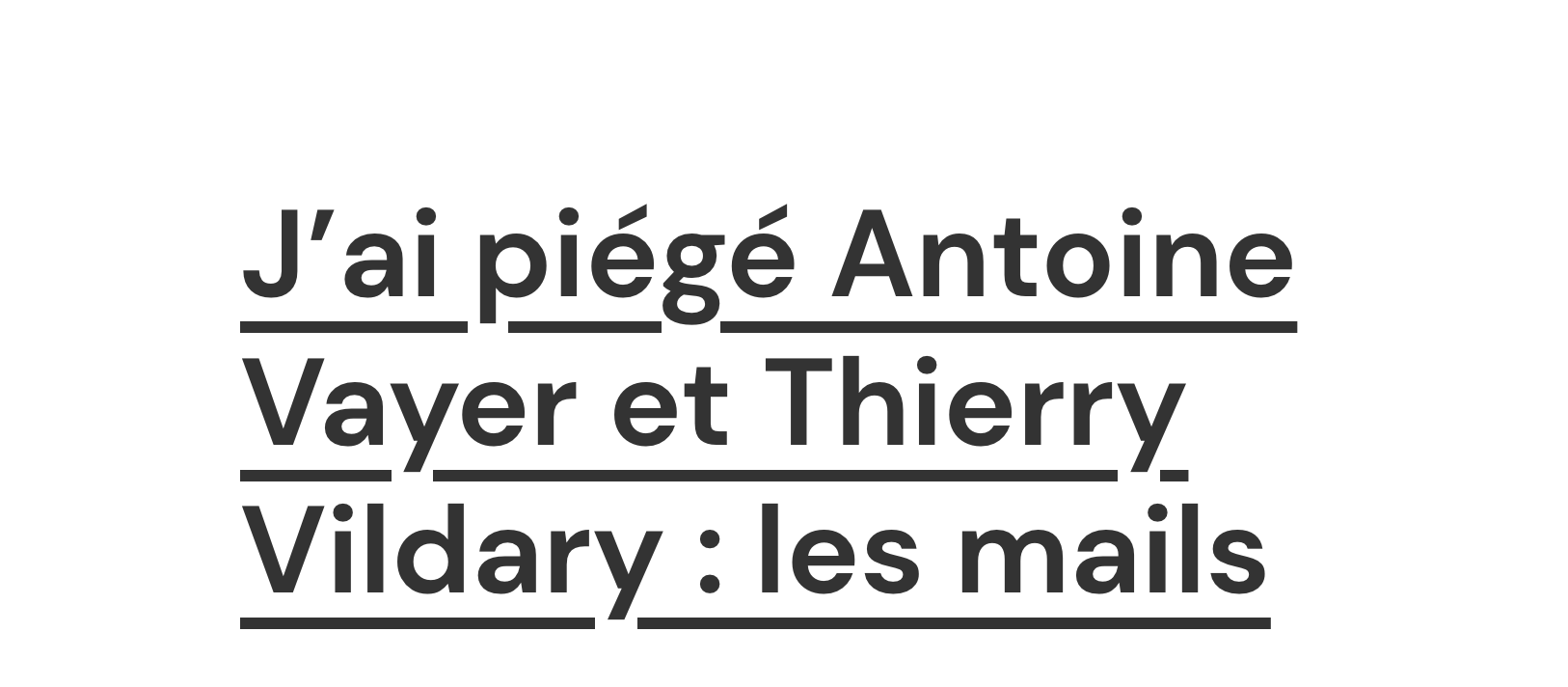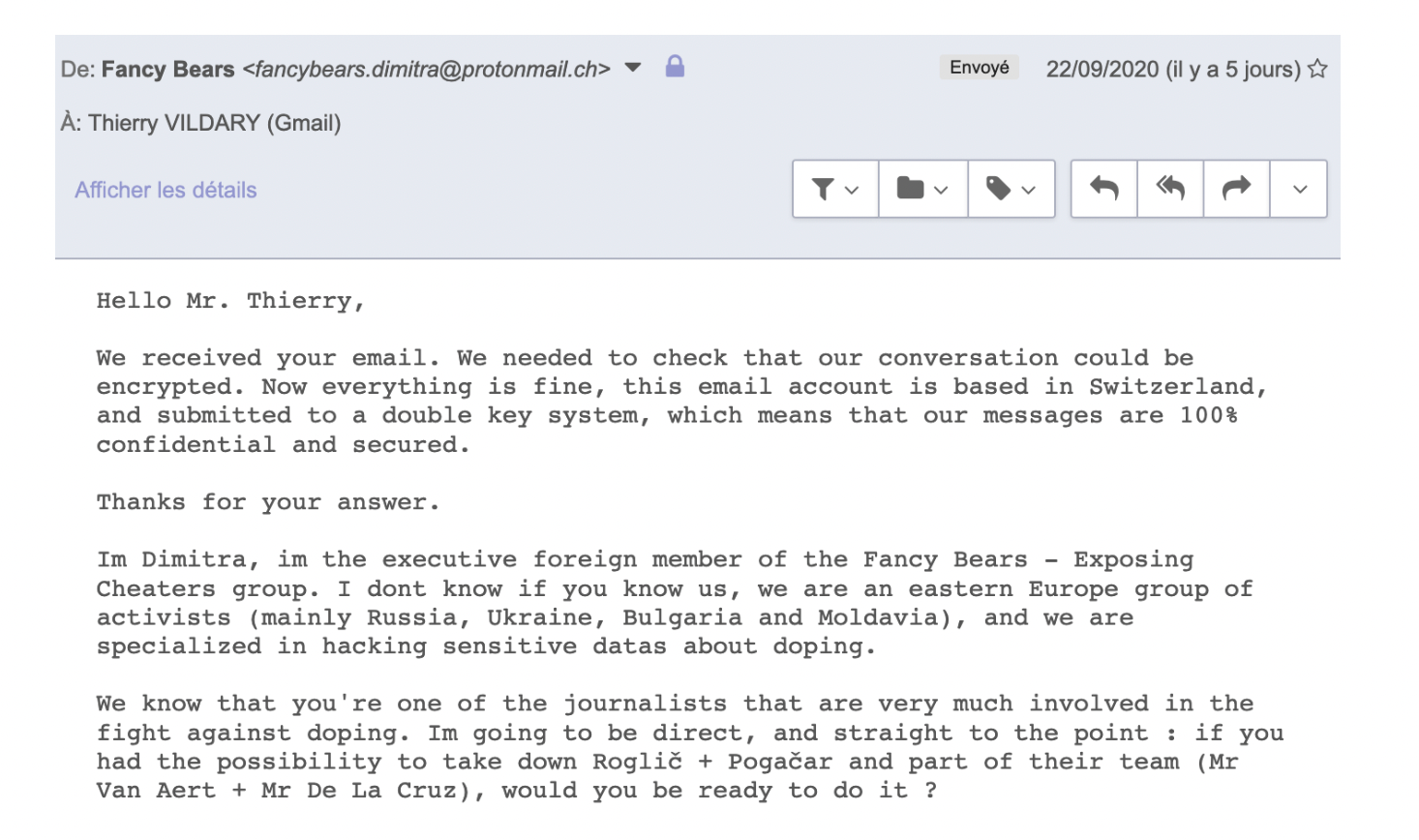Alleged Russian hackers, doping raids, Twitter beef, a Bahrain Victorious osteopath: The most bizarre story from this year’s Tour de France

(Photo: Getty Images)
Cycling has always been prone to a little bit of sensationalism.
In this respect, the 2022 Tour de France delivered. Jonas Vingegaard vs. Tadej Pogačar in a battle of the super-youths, remarkable stage wins by underdog candidates like Michael Matthews and Hugo Houle, and, last but not least, doping raid intrigue: Bahrain Victorious were raided in a Europol operation both immediately before and at the Tour itself.
It is this last story with which we will be concerned here.
What started as something that was pretty straightforward – “police search riders’ hotel” – has branched out, thanks to the absurdity proffered by the Internet into a sprawling online conflict whose roots date all the way back to the mid-2010s. It involves the likes of alleged Russian hacking rings, eccentric Hungarian engineers, an exasperatingly prolonged Twitter beef, a Bahrain Victorious osteopath, and so, so much more. Stick with me here.
On June 29th, 2022, just ahead of the Tour de France, an anonymous French blogger created a website on WordPress titled “In Cycling Veritas” (ICV). In it, the blogger claimed that they had, in short, fabricated a set of leaks that led to the 2021 and 2022 hotel and home raids on Bahrain Victorious riders and staff conducted by the Marseilles police and later Europol.
ICV claim to have done this for one reason: to ensnare the French anti-doping journalists Antoine Vayer and Thierry Vildary, who ICV claims are unethical “madmen” obsessed with doping to the detriment of everything else, and that the pair have undue influence over the French cycling press:
“Let’s make it simple: I trapped Antoine Vayer and Thierry Vildary by pretending to be someone else,” wrote ICV.
“In 2020, just after the arrival of the Tour in September … I contacted these two characters, making them believe that I had …information concerning the doping of the peloton. After a few days of conversation, the two accomplices swallowed everything, even the enormities that I invented over the emails. Without any verification, Antoine Vayer went so far as to broadcast fake news live on Twitter, concerning a totally invented pseudo new super-powerful doping product, the AK47 … which obviously came straight from my imagination.”
ICV later updated the page to clarify that “NONE of the lunar information that I mention in the emails is true …” and that “I take this opportunity to apologize to these riders, to these teams, for having had to mention their names by associating them with heavy doping.”
The logical starting place with regard to this whole affair is the people involved. Antoine Vayer is an ex-coach at Festina who later became a doping whistleblower-turned-columnist at several French newspapers, most recently Le Monde. Thierry Vildary works at French Télévision as an investigative journalist.
Both operate in a bit of a gonzo vein with regard to doping and their stories are popular topics of discussion on Twitter and in the dark recesses that are cycling forums. If you’ve been following cycling for a long time, you’ve probably come across Vayer’s websites cycling-dopage.com and ChronosWatts.
After the 2020 Tour de France, Vayer published a blog on ChronosWatts claiming to have received a leak from the Russian hacking group Fancy Bears, which has engaged in all kinds of forms of online espionage. These include hacks targeting such parties as the Democratic National Committee, the Dutch Ministry of General Affairs, and the Norwegian Parliament. In sports, however, they’re most well known for their 2016 attack on WADA, from which Fancy Bears published what appeared to be Therapeutic Use Exemptions for high profile athletes like Chris Froome, Bradley Wiggins, Simone Biles and Venus Willams in the wake of the revelation of the massive Olympic Russian doping scandal.
According to Vayer’s 2020 ChronosWatts blog, Fancy Bears, operating through an alias named “Dimitria,” allegedly solicited both Vildary and Vayer through email using the encrypted service ProtonMail.
Dimitria claimed to be working on behalf of “Our boss [who] is a Russian oil company CEO … [whose] goal is to create a team based in France and to win the Tour de France with a French rider in the next 10-15 years. He is ready to pay anyone that can team with us to take down cheaters.”
Per that same source, Dimitria wrote to Vayer that he had been trailing prominent teams clandestinely throughout the 2020 Tour de France and secured access to encrypted team chats on Telegram. The alleged claims against cycling mostly targeted UAE Team Emirates and Jumbo Visma. While VeloNews is unable to verify whether Fancy Bears were actually behind these emails (Russian hacking cartels are notoriously difficult to reach for comment), Vayer told VeloNews via WhatsApp that he still believes the leaks were real.

In any case, this ChonosWatts exposé lurked mostly in a specific subset of French anti-doping Twitter and the dark depths of cycling forums for two years and not much came of it. That is, until ICV showed up with his second blog post, which was posted on July 4th, 2022, shortly after the second Bahrain Victorious raid conducted right before the Tour de France.
In this post, he published screenshots of alleged emails between himself, posing as the same Russian hacker Dimitria from Fancy Bears, Vayer and Vildary along with lengthy editorial examinations pointing out their lack of journalistic ethics. The text of some of these ProtonMail email screenshots, especially the ones to Vayer, match some of those in the ChronosWatts post verbatim, while others are elongations of content Vayer allegedly truncated in the ChronosWatts post. Others still are new altogether.
A separate correspondence with Vildary is included that primarily deals with motor doping. Indeed, most of the offense taken by ICV in this second post concerns Vildary’s use of claims made by the Hungarian engineer Istvan Varjas, inventor of the hidden motor, that the UCI could not detect the most advanced forms of mechanical doping.
These claims, according to CyclingTips, made it all the way to the French police who then requested the UCI to allow them to search bikes at the 2015 Tour de France. That request was denied. If you are an anonymous blogger trying to establish a precedent of incendiary journalists and their associates successfully petitioning the higher-ups in the French police to terrorize innocent cyclists, this story fits well within that perspective.
However, it is also important to note that nothing ever came of the accusations made by Varjas. The UCI, the governing body of cycling, seemed to see straight through the French police request regarding mechanical doping and did not engage in a search of cyclists, telling CyclingTips in the same article: “The Union Cycliste Internationale (UCI) condemns the accusations being made in some news reports concerning the UCI’s commitment to tackle technological fraud and the tests made at this year’s Tour de France.”
Yet the details of Varjas’ accusations match almost verbatim many of those in the alleged Fancy Bears emails, including hidden magnetic systems controlled via Bluetooth. Those emails were written five years after Varjas made his claims.
When asked for comment, Vildary responded via Twitter to VeloNews: “Although I am very comfortable with what is written, I do not communicate on this subject. We (France TV and I) are thinking about legal consequences on this subject. That’s all I can say for now.”
Aside from Vayer, Vildary, Fancy Bears, and ICV, there is also a fifth character in this affair. One of the most curious elements of both posts is the repeated inclusion, though not by name, of Barnabé Moulin, the French physiotherapist from Bahrain Victorious whose house was raided in June. The blogger writes:
“… Vayer and Vildary, knowing they had been duped but not knowing by whom, accused falsely and unfairly. In particular, and this is the starting point of the Bahrain affair, a fellow, a physiotherapist from the Bahrain Merida team, of whom I still wonder to this day what he may well have to do with all this. Still, Vayer, in his absolute neurosis, decided that the culprit of the trap that I set up was him.”
Repeatedly, ICV also claims not to be Moulin. This is where it starts to get jumbled up.
When Moulin was asked by VeloNews who he thought published the ICV blog, he said that: “… these guys [Vayer and Vildary] are thinking it [the blog] is all coming from me because obviously the blogger is living in the same area as me. He contacted me since [the] last [Bahrain Victorious] investigation to explain to me what happened. He is not part of my circle of “known” people.”
When asked about the blog’s veracity, Moulin agreed with many of its points. “What I understood is that a lot of people are doubting the practices of these “specialists” [Vayer and Vildary], like for example the documentaries against engines in bikes made by the french tv journalist [Vildary] and this guy wanted to know by himself how it works. Also every year a scandal is occuring, coming from the same canal.
“What I would like is that people open their eyes to the interest of a certain part of cycling who have interest in maintaining suspicion for existing,” Moulin said, adding that Vayer specifically was “a strange man full of jealousy.” It is worth noting that Moulin, Vayer, and Vildary have been in a protracted Twitter conflict with one another for several years, first beginning in 2013 and continuing to this day.
Overall, there are a lot of red flags. Visually, the ICV email screenshots are inconsistent, switching typefaces and signatures, and in some cases the text is strangely aligned suggesting image manipulation, if only for reasons of readability.
Even if we give ICV the benefit of the doubt, the most glaring detail is that the Fancy Bears emails do not once mention Bahrain Victorious. They dealt primarily with Jumbo Visma and UAE Team Emirates, neither of whom have been raided by the Marseilles police despite how serious the claims in the Fancy Bears leaks are.
One expects that if said leaks were used to go after Bahrain, then surely they could have hit their intended targets as well. The way the Fancy Bears emails are connected with Bahrain Victorious in the ICV posts is fragile. The writer claims in the first post that “[Vayer] therefore set up the Bahrain affair from scratch in order to be able to carry out searches, thanks to a public prosecutor’s office in Marseille, in order to seize the computers of the said physiotherapist.”
The link here is that Vildary allegedly says in one of the reproduced emails that he’s friends with a high ranking judge. ICV then extrapolates this to mean “that this friend of Thierry Vildary is in a high position at the Marseille Public Prosecutor’s Office” – the one responsible for the Bahrain Victorious raid at the 2021 Tour de France.
This “firm personal conviction” is the only connection that tethers the Fancy Bears emails and Bahrain Victorious at all. It is worth considering the present breadth of the Bahrain case, particularly the fact that it is no longer limited just to France, where Vayer and Vildary have media influence.

Per VeloNews previously, these raids resulted in the seizure of electronics and medicines from the team, where they now await further analysis. That items were seized is not to imply that Bahrain Victorious is guilty of any crime. To make matters more complicated, the muscle relaxant Tizanidine was found in hair samples taken from riders searched at the 2021 Tour.
Bahrain Victorious was the only team subject to search. After this revelation, the team issued a statement saying that the team and its riders “have not been officially or unofficially notified about any findings related to tizanidine or other substances.” Tizanidine is not on the WADA prohibited substances list and is therefore not subject to French anti-doping laws.
In light of the length, depth, and geographical scope of the present investigation, ICV’s implied claim that the whole thing was orchestrated by Vayer and Vildary in order to get revenge on Moulin because Vayer and Vildary believed that Moulin was posing as Fancy Bears in order to embarrass them, seems implausible. Note also that no bikes nor mechanical equipment from Bahrain Victorious have as of yet been knowingly disassembled or confiscated by police, putting a damper on the idea that suspected motor-doping – a large part of the Fancy Bears accusations and consequent ICV takedown – was among the reasons the team was searched.
The question at heart of whether anti-doping journalists like Vildary and Vayer have undue influence in the press is less black and white. It is true that these journalists are given a voice at high-profile outlets and thus have a role in shaping public opinion and also in damaging the reputations of teams who have neither been accused nor found guilty of wrongdoing, something worth critically examining at another time. Yet the scope of the pair’s influence seems to rarely penetrate the broader governance systems of cycling such as WADA, the UCI, or even organizations like the ASO, organizer of the Tour de France.
Even if we take ICV’s claims of Vayer and Vildary’s power at face value, nothing concrete on behalf of those governing bodies seems to have transpired because of the two main cases cited in the ICV blog: the Fancy Bears emails or Varjas’ motor-doping claims. Certain elements of the former never even made their way into the press to begin with. For example, there is no mention of a super doping drug “AK47” anywhere in the press – in French or any other language – other than on Vayer’s Twitter. It seems as though at least some editorial standards still hold.
In addition, even if we consider ICV’s claim that Vildary is the one who sicced the Marseilles police on Bahrain Victorious, Europol, which has taken over the case, is a massive, multinational anti-crime organization that simply does not operate at the same scale of potential petty interpersonal influence as a local French judge.
Its investigation has been carried out not only in France, but also in places where Vayer and Vildary have little to no influence: Italy, Denmark, Slovenia, and Croatia. VeloNews reached out to Europol, whose representatives said that they could not comment on an ongoing investigation. Vayer, when asked about the Bahrain connection added that he thought Bahrain was raided because the “UCI don’t want them anymore.”
When contacted by VeloNews via phone about the blogs, Bahrain Victorious said: “From a team perspective, we saw [in the ICV piece] that false accusations were being made against us and other teams. It reminded us of the statements made by sports directors in other teams in Le Parisien after Mark Padun’s stage wins in the Dauphine last year. For us the post is very comprehensive with all the emails and details and now it seems Vayer is trying to save face. People like him put doubt across the peloton. If the post is true, the fact that this false information can spread so far is sad to us.”
In the end, neither the claims made in the Fancy Bears emails nor the ICV post can, at present, be substantiated in a way that holds either legal or journalistic water, at least in an ethical way where I am held to the same standards as ICV holds his two targets.
Until a time comes when that content can be plausibly confirmed or denied, what we appear to be witnessing is a tale as old as time: two parties engaging in a blogging war, albeit one that now involves one of the most successful WorldTour cycling teams and high-profile French journalists. Either that, or it’s the world’s biggest cycling conspiracy theory. I’ll leave that up to you, the reader, to decide.